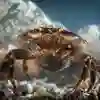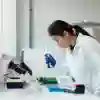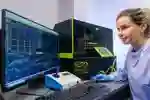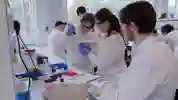



Biology at Hull is all about tackling global challenges, from genetic engineering through to climate change.
You’ll gain real world practical skills in the lab and in the field, and learn to communicate important topics in biology to diverse audiences. Plus, you'll study in a supportive and friendly department which includes winners of the Royal Society of Biology’s Higher Education Bioscience Teacher of the Year Award.
You can also opt to take a year abroad, studying overseas at one of our partner universities. Gain new skills, build international contacts, and immerse yourself in a different culture and environment.
About this course
This degree reflects the breadth of modern biological sciences, with core topics including genetics and genomics, microbiology, evolution, cell biology and biological diversity.
We’ll help you build your degree around your interests, like molecular genomics, toxicology, applied ecology or other specialist topics. Fascinated by human biology? You can also take modules from biomedical sciences. Or if you’re interested in all areas of biology you can take a broad range of options – the choice is yours.
You'll get plenty of hands-on training in the lab and field and you'll work on mini-projects throughout your course.
You can also take one of our residential field course options, including overseas trips to Brazil or Mallorca, where you’ll learn essential skills for ecological careers, or opt to spend a year studying abroad at one of our partner universities. Gain new skills, build international contacts, and immerse yourself in a different culture and environment.
Other facilities include super-computing power for genomic analysis, our 33,000 litre tropical aquarium, and a dedicated team of teaching technicians to support your skill development.
It's in our DNA to make a difference.
Module options
Each year, you’ll study modules worth a certain number of credits, and you need 120 credits per year. Most modules are 20 credits – so you’ll study six modules each year. Some longer modules, such as a dissertation, are worth more. In these cases, you’ll study fewer modules - but the number of credits will always add up to 120. Some modules are compulsory, some are optional, so you can build a course that’s right for you.
Filters
Microbiology
How does microbiology govern our world? In this module you will learn the basic principles of microbiology, before exploring the interplay between microbes, ourselves, and the wider environment.
compulsory
20 credits
Cells and Organelles
Explore the fascinating inner workings of cells, giving you a foundation in areas such as cell biology, molecular biology and biochemistry.
compulsory
20 credits
Diversity of Life
Through practical workshops, this module introduces you to the diversity of life and the fascinating adaptations that enable organisms to inhabit nearly all conceivable ecological niches.
compulsory
20 credits
Molecular Biology and Genetics
DNA holds the secrets to life itself. Find out how key information is stored within the genes and the processes by which cells decode and interpret this genetic information to bring about essential cellular functions. You will discover how genetic information is inherited and what happens when things go wrong. Explore how molecular biology and genetic manipulation techniques allow us to uncover why genetic changes can lead to human disease and can potentially offer opportunities to diagnose and even treat them.
compulsory
20 credits
Evolution
Why did sex evolve? Why do we die? What is a species? How can evolutionary medicine help us? This module will provide you with an understanding of how life on earth came to be what it is, from genes to species. Without evolution, nothing in biology makes sense.
compulsory
20 credits
Genetic Analysis
This module takes a problem-based approach to understanding modern Molecular Genetics and Genomics. Students will learn to participate in current debates and become accustomed with modern methods of laboratory investigation and genetic data analysis. A week-long laboratory session allows students to participate in current research and prepares them for careers in the molecular laboratory. This module focuses on Eukaryotes. It is also expected that students are already familiar with the basics of Genetics that was taught in Molecular Biology and Genetics.
compulsory
20 credits
Vertebrate Zoology
This module provides an integrated view of vertebrate biology by showing how changes over time and geography drive morphology, physiology, behaviour, and ecology in different vertebrates. Structure-function relationships are presented to appreciate how different animals evolve similar solutions and adaptations to the same ecological challenge while closely-related animals diversify in response to different environmental challenges.
compulsory
20 credits
Molecular Evolution and Genomics
What was the last common ancestor of all living organisms? What is all this junk doing in your genome and why is it there? How does speciation really occur? How does evolution shape disease, pathogens and parasites? How does evolution rapidly change animal body shape? We will learn about these questions and many more using knowledge from modern genomics and 'big biology'.
compulsory
20 credits
Metabolism
Examine the biological processes that allow the ‘symphony of life’ to occur. Understanding key metabolic concepts will further your understanding of biology itself, from human disease to the flow of energy through ecological systems so will feed in well with the other modules available to study.
optional
20 credits
Our facilities




Watchlist
Dr David Lunt
Course overview
3 mins
Extracting DNA
Course Highlight
2 mins
Teaching Facilities
University life
2 mins
Accommodation at Hull
University life
2 mins
Featured academics
We're tackling cancer and cardiovascular disease with the cutting-edge biomarker and medical imaging technologies we developed here at Hull, in collaboration with colleagues around the world.
We're committed to sharing our knowledge with and inspiring our students.

Dr Africa Gomez
Senior Lecturer
Africa is an evolutionary biologist whose research centres on the impact of sexual systems on population structure, phylogeography and genomics. She has published more than 50 peer-reviewed papers and obtained her PhD at the University of Valencia.

Dr Domino Joyce
Senior Lecturer
Domino became interested in conservation genetics during her undergraduate degree, working on UK butterflies with Natural England for her PhD. A switch in allegiance from insects to fishes then led to a Leverhulme Fellowship and a teaching career.
Entry Requirements
What do I need?
This course is currently available through Clearing, which means our entry requirements are a bit different to what they would normally be.
At Hull, you're a name not a number. During Clearing, we look at all of your qualifications and experience, not just your academic grades. We may be able to offer you a place whatever your situation. Get started by completing our eligibility checker, and find out immediately if you could study at the University of Hull.
Have questions? Our admissions team will be happy to help.
Fees & Funding
How much is it?

Future prospects
The field, analytic and lab skills you’ll learn here are much in demand, and you’ll get the chance to engage with potential employers in a range of local organisations and businesses.
Our graduates have gained jobs in bioscience industries, teaching, veterinary medicine, ecological consultancy and scientists in government and non-government organisations. Our students also go on to further study through either Masters or PhD level qualifications, becoming scientific leaders of the future.
Become part of the next generation of futuremakers
Like what you’ve seen? Then it’s time to apply.
The standard way to apply is through UCAS. This will give you the chance to showcase your skills, qualities and passion for the subject, as well as providing us with your academic qualifications.
Not ready to apply yet?
Visit our next Open Day, and see all that the University of Hull has to offer. Talk to our lecturers about your subject, find out what university is really like from our current students, and take a tour of our beautiful campus and amazing facilities.
You may also be interested in...
Choose subsidised dive training as part of our Ecology module and become a PADI-certified Advanced Open Water Diver. Extra fee may be payable.
Most overseas field trips run in the summer between the second and third year. There is an extra charge but the trips are subsidised. Destinations are subject to change.
Biology is ranked joint 3rd in the UK for Value Added Score. The Guardian University Rankings 2026.
Our department includes winners of the Royal Society of Biology's Education Bioscience Teacher of the Year Award.
All modules on this course page are subject to availability and this list may change at any time.